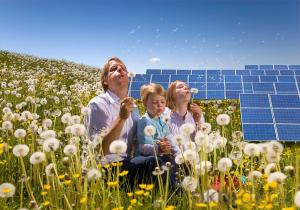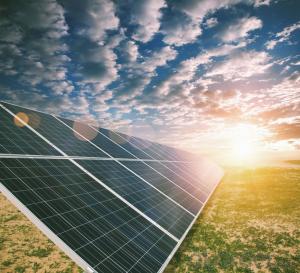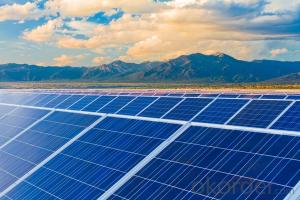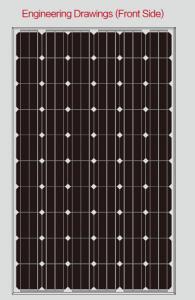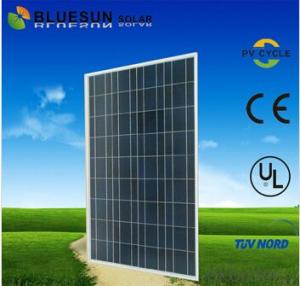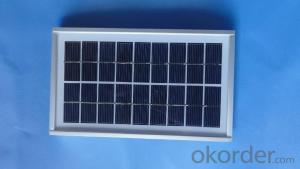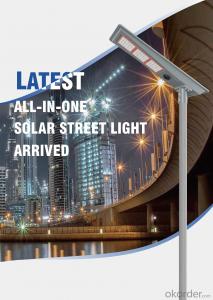CNBM Polycrystalline Silicon 255W Solar Module
- Loading Port:
- China main port
- Payment Terms:
- TT OR LC
- Min Order Qty:
- 100000 watt
- Supply Capability:
- 10000000 watt/month
OKorder Service Pledge
OKorder Financial Service
You Might Also Like
Item specifice
About CNBM
CNBM International Corp, established in 2004, is the business entity for trade and logistic of CNBM Group.With the advantages in Cement, Composite Materials, NewBuilding Materials and Engineering, CNBM mainly concentrate on coal, steel and construction equipments and give priority to solar and wind energy development.CNBMInternational is highly recognized by its business partners and clients all over the world and has established good business relationship with the customers in over 120 countries and regions all over the world.
The capacity of CNBMSOLAR is reach to 1GW, and make sure each year our shipment capacity is more than 700-800MWs, at the same time, we have set up the largest solar power station with our partner in Ukraine.
Characteristics of Polycrystalline Silicon Solar Panel
Solar Cell : High efficiency crystalline solar cell. Even if under the weak light, the solar module can produce maximum power output.
Tempered glass (toughened glass): Anti-reflecting coating and high transmission rate glass increase the power output and mechanical strength of solar module.
EVA and TPT: Using high quality EVA and TPT to prevent destroying and water.
AI frame: Without screw, corner connection. 6 holes on the frame can be installed easily.
Junction box: Multi function junction box with water proof.
Long lifetime: ≥25 years; Less power decrease.
Good performance of preventing from atrocious weather such as wind and hails.
Resisting moisture and etching effectively, not effected by geology.
The certificate issued by international authority: UL, TUV, IEC, VDE, CE.
Standard Test Conditions of Polycrystalline Silicon Solar Panel
The opto-electrical specifications shown below are stabilized values being measured at Standard Test Conditions of multicrystalline silicon Solar Panel, Irradiance: 1000W/m2, Spectrum: AM1.5 at 25°C, The info below is subject to manufacturing tolerances. Where appropriate minutes of measurement are available and are used for the dimensioning of the installation.
Advantages of Polycrystalline Silicon Solar Panel
A&M Solar performance guarantees for 25 years
12 years guarantee for workmanship for multicrystalline silicon Solar Panel
Timeliness of delivery
Quality Products certified (TÜV, UL, CE, VDE, ISO)
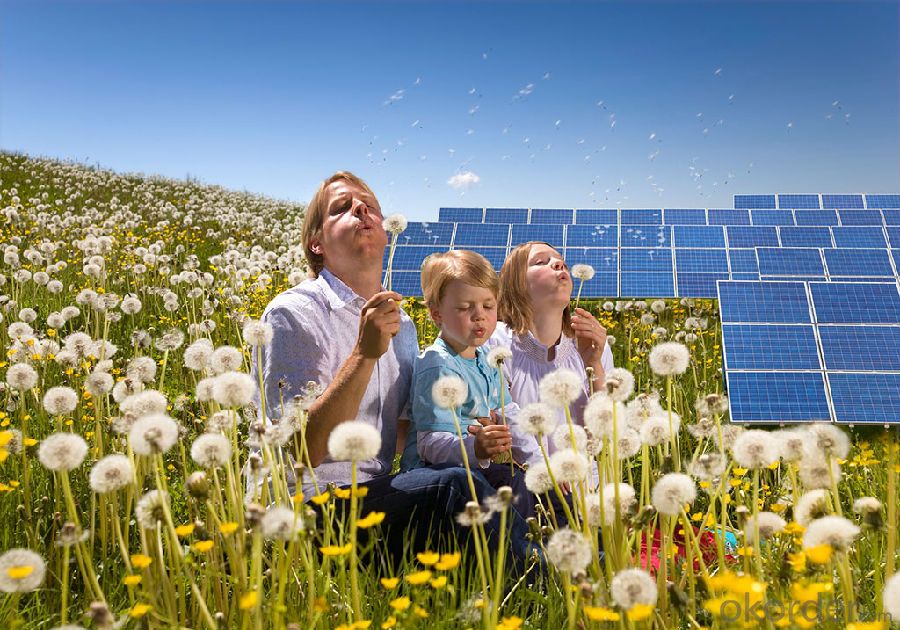
FAQ:
Q1: Why buy Materials & Equipment from OKorder.com?
A: All products offered by OKorder.com are carefully selected from China's most reliable manufacturing enterprises. Through its ISO certifications, OKorder.com adheres to the highest standards and a commitment to supply chain safety and customer satisfaction.
Q2: What is a solar PV module?
A: A solar PV module consists of many solar cells that are connected together (typically in series) and packaged in a frame (typically made of aluminum).
Q3: What are the advantages and disadvantages of monocrystalline solar PV modules?
A: Monocrystalline solar PV modules are the most efficient type of solar PV modules, with the exception of CdTe thin film solar PV modules. As a result, monocrystalline solar PV modules are more expensive when compared to almost all other types of solar PV modules.
Data sheet
| Maximum Power | 255W |
| Efficiency | 0.157 |
| Backsheet | White |
| Frame Colar | Silver |
| Manufacture Site | China |
| Frame | Anodized Aluminum Alloy |
| Weight | 19 kg |
- Q:For example, If I were powering my house with solar panels, would it be more efficient or effective, (or I guess would I get more energy) out of a day that measured 90 degrees Fahrenheit as opposed to a day that is 70 degrees Fahrenheit.
- no only the sunlight is used in generating electricity
- Q:Can solar panels be used in areas with frequent power outages?
- Yes, solar panels can be used in areas with frequent power outages. Solar panels generate electricity from sunlight, so as long as there is sunlight available, they can continue to produce power even during power outages. Additionally, solar panels can be equipped with battery storage systems to store excess energy generated during the day for use during periods of low sunlight or power outages, making them a reliable source of electricity in areas with frequent power disruptions.
- Q:Can solar panels be installed on churches or religious institutions?
- Yes, solar panels can be installed on churches or religious institutions. In fact, many religious institutions have embraced solar energy as a way to reduce their carbon footprint and promote environmental sustainability. Installing solar panels on churches not only helps them save on energy costs but also serves as a symbol of their commitment to caring for the planet and being good stewards of the environment.
- Q:Can solar panels be installed on a library or educational institution?
- Yes, solar panels can be installed on a library or educational institution. In fact, many libraries and educational institutions have already embraced solar energy and installed solar panels on their rooftops or surrounding areas. This helps them reduce their carbon footprint, save on electricity bills, and serve as a sustainable example for the community.
- Q:I've run out of things to keep me entertained recently and as part of a larger project, I was curious if its possible to 'McGuyver' up a solar panel out of common materials?
- Building your own panels can be an interesting experiment, but if you are looking for solar panels to provide significant, consistent output, you should buy factory made ones. I get lots of calls from people who built their own panels and get a fraction of the advertised output from them. Plus, factory built panels will last 40 - 50 years, with a 25 year warranty, how sure are you that you can build something that can withstand the outdoors for that long? The price of panels has dropped a lot this year, plus with rebates and tax credits, it's getting more affordable.
- Q:I need a list of worldwide solar panel manufactures from china, US, Spain, Germany, Japan etc...Can any one direct ne to such place?I rather it will also contain comparison of parameters like efficiacy, quality etc and to be divedied by country of manufacturing.Thank you
- You can't buy at that level unless you are connected to governement. A lot of production is already spoken for for years to come. Where you live determines what you can legally buy and install. The EU has it's own certification, the US has 2 sets, the Canadians have their own. Your answer also requires knowing the use for the solar panels, whether it is grid-tie, off-grid or standalone to power an appliance. And you have to choose mono crystalline, poly crystalline, or thin-film.
- Q:Can solar panels be used in countries with limited sunlight?
- Yes, solar panels can still be used in countries with limited sunlight. While solar panels are most effective in areas with abundant sunlight, they can still generate electricity even in regions with less sunlight. Advances in solar technology and the ability to capture diffuse sunlight have made it possible for solar panels to be used in countries with limited sunlight. Additionally, the efficiency of solar panels has improved over time, allowing them to generate electricity even in low-light conditions.
- Q:Can solar panels be used off-grid?
- Yes, solar panels can be used off-grid. Off-grid solar systems are designed to generate electricity independently from the utility grid. These systems can store excess energy in batteries for use during times when the sun is not shining or when power is needed at night. Off-grid solar panels are commonly used in remote locations, such as cabins, RVs, boats, and even in developing countries without access to reliable grid electricity.
- Q:I want to add solar panels to my home. I was looking online and it seems there are so many different kinds! How does it hook up to the electrical grid? How much do I need for a 2000 sf home?
- There are different solar panels for different uses For a domestic home it all depends on how much electricity you are going to use per month or per year For a normal use home (2 adults, 2 children) I presume one need to install a panels that would produce about4 to 5000 Kilo wats of energy per year Based on the type and the out put of the panels the suppler and the person who is advising you will guide you how many panels you will be requiring to install Take a professional help They are better informed and also knowledgeable
- Q:Can solar panels be used in areas with high winds?
- Yes, solar panels can be used in areas with high winds. However, it is important to ensure that the solar panel installations are properly designed and anchored to withstand the wind speeds typical for the area. Additionally, selecting durable and wind-resistant panel models can help mitigate any potential damage caused by strong winds.
1. Manufacturer Overview |
|
|---|---|
| Location | |
| Year Established | |
| Annual Output Value | |
| Main Markets | |
| Company Certifications | |
2. Manufacturer Certificates |
|
|---|---|
| a) Certification Name | |
| Range | |
| Reference | |
| Validity Period | |
3. Manufacturer Capability |
|
|---|---|
| a)Trade Capacity | |
| Nearest Port | |
| Export Percentage | |
| No.of Employees in Trade Department | |
| Language Spoken: | |
| b)Factory Information | |
| Factory Size: | |
| No. of Production Lines | |
| Contract Manufacturing | |
| Product Price Range | |
Send your message to us
CNBM Polycrystalline Silicon 255W Solar Module
- Loading Port:
- China main port
- Payment Terms:
- TT OR LC
- Min Order Qty:
- 100000 watt
- Supply Capability:
- 10000000 watt/month
OKorder Service Pledge
OKorder Financial Service
Similar products
New products
Hot products
Related keywords
